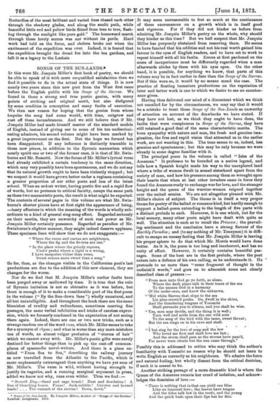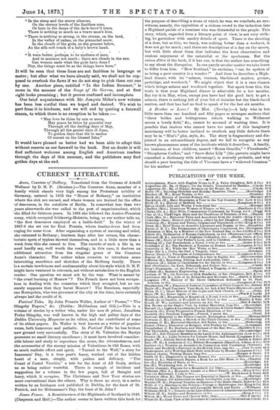SONGS OF THE SUN-LANDS.
IF this were Mr. Joaquin Miller's first book of poetry, we should be able to speak of it with more unqualified satisfaction than we find it possible to do in the actual state of things. It is now nearly two years since this new poet from the West first came before the English public with his Songs of the Sierras. We found in these a strong and true poetic genius, with many points of striking and original merit, but also disfigured by some crudities in conception and many faults of execution. We then saw reason for hoping that the genius from whose impulse the song had come would, with time, outgrow and oast off these incumbrances. And we still believe that if Mr. Joaquin Miller had made himself master of the standard models
of English, instead of giving ear to some of his too undiscrhni- mating admirers, his second volume might have been marked by a great improvement on the first. But the hope we formed has been disappointed. If any influence is distinctly traceable in
these new pieces, in addition to the Byronic mannerism which nearly spoilt one or two of the former ones, it is that of Mr. Swin- barne and Mr. Rossetti. Now the forms of Mr. Miller's lyrical verse bad already exhibited a certain tendency in the same direction, which may very possibly have been spontaneous, and we do not say that its natural growth ought to have been violently stopped ; but we suspect it would have grown better under a regimen containing a greater proportion of our older poets and less of the latest school. When an ardent writer, having poetic fire and a rapid flow of words, but no pretence to critical faculty, essays the same path as these two manneristic poets, the result is what might be expected.
'The contents of several pages in this volume are what Mr. Swin- burne's shorter pieces have at first sight the appearance of being, —hasty effusions in which the meaning of the words is wholly sub- ordinate to a kind of general sing-song effect. Regarded seriously on their merits, they are unworthy of such real power as Mr. -Joaquin Miller certainly possesses. Regarded as parodies of Mr. Swinburne's slighter manner, they might indeed deserve applause. These specimen lines will show that we do not exaggerate :—
"Where the cocoa and cactus are neighbours,
Where the fig and the fir-tree are one." "In the place where the grizzly repose; Under peaks where a right is a wrong, I have memories richer than rose; Sweet echoes more sweet than a song."
So far, then, as the changes visible in the Californian poet's last productions are due to the addition of this new element, they are changes for the worse.
Nor do we find that M. Joaquin Miller's earlier faults have been purged away or mellowed by time. It is true that the vein -of Byronic imitation is not so obtrusive as it was before, but there is enough of it to make a considerable part of the first poem in the volume (" By the Sun-down Seas ") wholly unnatural, and all but unintelligible. And throughout the book there are the same blemishes of crudity and redundance, sometimes marring fine passages, the same verbal infelicities and tricks of careless expres- sion, which we formerly condoned in the expectation of not seeing them again. Indeed, there are one or two new tricks, such as a strange random use of the word rune, which Mr. Miller seems to take for a synonym of rhyme ; and what is worse than any mere mistaken we of words, an almost vulgar profusion of "storms of hair" which we cannot away with. Mr. Miller's poetic gifts were surely destined for better things than to pick up the cast-off common- places of spasmodic novel-writers. And there is a piece en- titled "From Sea to Sea," describing the railway journey as now travelled from the Atlantic to the Pacific, which is more unpleasantly extravagant than anything we have yet seen of Mr. Miller's. The verse is wild, without having strength to justify its vagaries, and a running marginal argument in prose, added we know not why, runs even wilder. Thus we find : —
"Seventh Day.—Sand and sage brush! Dust and desolation A line of bleaching bones. Foxes ! Jack-rabbits ! Coyotes and horned toads! . . . The summit of the sierras ! Down, down."
* Songs of the Sun-Lands. By Joaquin Miller, Author of "Songs of the Sierras." London: Longmans. 1873.
It may seem unreasonable to fret so much at the continuance of these excrescences on a growth which is in itself good and vigorous. For if they did not hinder us before from admiring Mr. Joaquin Miller's poetry on the whole, why should they hinder us this time ? But we half suspect that Mr. Joaquin Miller has purposely abstained from removing them. He seems to have fancied that his oddities and not his real worth gained him favour in the eyes of English readers, and to have set to work to repeat himself with all his faults. Errors at first pardoned on the score of inexperience must be differently regarded when a man afterwards abides by them with his eyes open. On the other hand, it is possible, for anything we know, that parts of this volume may be in fact earlier in date than the Songs of the Sierras. But if this were so, it would by no means mend the case. The practice of floating immature productions on the reputation of later and better work is one to which we desire to see no counten- ance given.
Having thus delivered our mind of a discontent which we think not uncalled for by the circumstances, we may say that it would be a mistake to treat these Songs of the Sun-Lands as unworthy of attention on account of the drawbacks we have stated. If they have not lost, as we think they ought to have done, the faults that were conspicuous in Songs of the Sierras, they have still retained a good deal of the same characteristic merits. The keen sympathy with nature and man, the fresh and genuine ima- gination, the free and rapid vision that attracted us in the earlier work, are not wanting in this. The tone seems to us, indeed, less genuine and spontaneous; but this may be only because we were already in some degree familiar with it.
The principal poem in the volume is called "Isles of the Amazons." it professes to be founded on a native legend, and tells how a Spanish knight made his way to the unexplored land where a tribe of women dwelt in armed sisterhood apart from the society of man, and how his presence among them so wrought upon their hearts that when at last other invaders came in force they found the Amazons ready to exchange war for love, and the stranger knight and the queen of the warrior-women reigned together over the united armies. We are not altogether pleased with Mr. Miller's choice of subject. The theme is in itself a very proper theme for poetry of the ballad or romance kind, but hardly enough to support a ballad-poem extending to the length of five parts with a distinct prelude to each. Moreover, it is one which, but for the local scenery, many other poets might have dealt with quite as well. The situation is such as to recall the Princess ; the prevail- ing sentiment and the conclusion have a strong flavour of the Earthly Paradise ; and (to say nothing of Mr. Tennyson) it is diffi- cult to escape an uneasy feeling that Mr. Joaquin Miller is leaving his proper sphere to do that which Mr. Morris would have done better. As it is, the poem is too long and incoherent, and has no unity of effect. However, it certainly contains beautiful pas- sages. Some of the best are in the first prelude, where the poet enters into a defence of his own calling, as he understands it. He pretends to no more than "some fragment of thought in the unfinish'd words," and goes on to admonish some not clearly described class of persons :—
" From men unto God go ye forth, as alone, Where the dark pines talk in their tones of the sea
To the unseen God in a harmony Of the under-seas, and know the unknown.
"Mid white Sierras that slope to the sea Lie pine-crown'd peaks. Go, dwell in the skies, And the thundering tongues of Yosemitci Shall persuade you to silence, and you shall be wise.
"Yea, men may decide, and the thing it is well ; Turn well and aside from the one wild note To the song of the bird with the tame, sweet throat ; But the sea sings on in his cave and shell.
"I but sing for the love of song and the few Who loved me first and shall love me last ; And the storm shall pass as the storms have pass'd, For never were clouds but the sun came through."
Possibly this is addressed to critics who may think the author's familiarity with Yosemite no reason why he should not learn to write English as correctly as his neighbours. We admire the force and natural feeling, but wholly dissent from the critical doctrine, if such it is meant to be.
Another striking passage of a more dramatic kind is where the Queen of the Amazons recants her creed of isolation, and acknow- ledges the dominion of love :—
" There is nothing that is that can yield one bliss Like an innocent love ; the leaves have tongue And the tides talk low in the reeds, and the young And the quick bads open their lips but for this.
"In the steep and the starry silences, On the stormy levels of the limitless seas, Or here in the deeps of the dark-brow'd trees, There is nothing so much as a brave man's kiss.
." There is nothing so strong, in the stream, on the land, In the valley of palms, on the pinnacled snow, In the clouds of the gods, on the grasses below, As the silk-soft touch of a baby's brown hand.
"It were bettor, perhaps, to be mothers of men, And to murmur not much ; there are clouds in the sun.
Can woman undo what the gods have done ? Nay, the things must be as the things have been."
It will be seen that these lines are not faultless in language or metre; but after what we have already said, we shall not be sup- posed to overlook the flaws if we do not stop to pick them out one by one. Another piece, entitled "In the Indian Summer," is snore in the manner of the Songs of the Sierras, and at first eight looks promising ; but it proves confused and incomplete.
Our brief acquaintance with Mr. Joaquin Miller's new volume has been less cordial than we hoped and desired. We wish to part from it in kindness, and we will end by quoting a farewell :stanza, to which there is no exception to be taken :—
" May love be thine by sun or moon, May peace be thine by peaceful way Through all the darling days of May,
Through all the genial days of June, To golden days that die in smiles Of sunset on the blessed Isles."
It would have pleased U8 better had we been able to adopt this without reserve as our farewell to the book. But no doubt it will find sufficient welcome among English and American readers through the days of this summer, and the publishers may find golden days at the end.



































 Previous page
Previous page